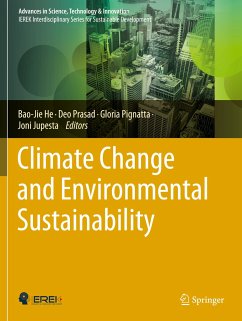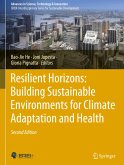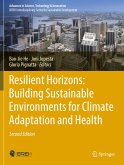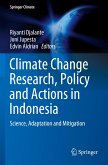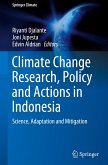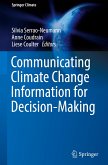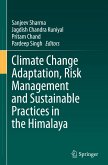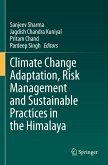Climate Change and Environmental Sustainability
Herausgegeben:He, Bao-Jie; Prasad, Deo; Pignatta, Gloria; Jupesta, Joni
Climate Change and Environmental Sustainability
Herausgegeben:He, Bao-Jie; Prasad, Deo; Pignatta, Gloria; Jupesta, Joni
- Broschiertes Buch
- Merkliste
- Auf die Merkliste
- Bewerten Bewerten
- Teilen
- Produkt teilen
- Produkterinnerung
- Produkterinnerung
This book discusses the challenges related to climate change mitigation and adaptation. It adds valuable strategies and insights into the development of new practices solving the identified social and economic problems related to ecosystem deterioration and anticipating other disasters related to climate change. As the decarbonization of cities and communities became an issue of great interest to many researchers, the book in hands will be of great importance to decision-makers and energy stakeholders and others seeking a more resilient and sustainable future and developing innovative…mehr
Andere Kunden interessierten sich auch für
![Resilient Horizons: Building Sustainable Environments for Climate Adaptation and Health Resilient Horizons: Building Sustainable Environments for Climate Adaptation and Health]() Resilient Horizons: Building Sustainable Environments for Climate Adaptation and Health169,99 €
Resilient Horizons: Building Sustainable Environments for Climate Adaptation and Health169,99 €![Resilient Horizons: Building Sustainable Environments for Climate Adaptation and Health Resilient Horizons: Building Sustainable Environments for Climate Adaptation and Health]() Resilient Horizons: Building Sustainable Environments for Climate Adaptation and Health154,99 €
Resilient Horizons: Building Sustainable Environments for Climate Adaptation and Health154,99 €![Climate Change Research, Policy and Actions in Indonesia Climate Change Research, Policy and Actions in Indonesia]() Climate Change Research, Policy and Actions in Indonesia123,99 €
Climate Change Research, Policy and Actions in Indonesia123,99 €![Climate Change Research, Policy and Actions in Indonesia Climate Change Research, Policy and Actions in Indonesia]() Climate Change Research, Policy and Actions in Indonesia123,99 €
Climate Change Research, Policy and Actions in Indonesia123,99 €![Communicating Climate Change Information for Decision-Making Communicating Climate Change Information for Decision-Making]() Communicating Climate Change Information for Decision-Making93,99 €
Communicating Climate Change Information for Decision-Making93,99 €![Climate Change Adaptation, Risk Management and Sustainable Practices in the Himalaya Climate Change Adaptation, Risk Management and Sustainable Practices in the Himalaya]() Climate Change Adaptation, Risk Management and Sustainable Practices in the Himalaya116,99 €
Climate Change Adaptation, Risk Management and Sustainable Practices in the Himalaya116,99 €![Climate Change Adaptation, Risk Management and Sustainable Practices in the Himalaya Climate Change Adaptation, Risk Management and Sustainable Practices in the Himalaya]() Climate Change Adaptation, Risk Management and Sustainable Practices in the Himalaya116,99 €
Climate Change Adaptation, Risk Management and Sustainable Practices in the Himalaya116,99 €-
-
-
This book discusses the challenges related to climate change mitigation and adaptation. It adds valuable strategies and insights into the development of new practices solving the identified social and economic problems related to ecosystem deterioration and anticipating other disasters related to climate change. As the decarbonization of cities and communities became an issue of great interest to many researchers, the book in hands will be of great importance to decision-makers and energy stakeholders and others seeking a more resilient and sustainable future and developing innovative technologies to overcome environmental deterioration.
This book is a culmination of selected research papers from the first version of the international conference on 'Climate Chance and Environmental Sustainability' which was held in 2021 in collaboration with Chongqing University, China.
This book is a culmination of selected research papers from the first version of the international conference on 'Climate Chance and Environmental Sustainability' which was held in 2021 in collaboration with Chongqing University, China.
Produktdetails
- Produktdetails
- Advances in Science, Technology & Innovation
- Verlag: Springer / Springer International Publishing / Springer, Berlin
- Artikelnr. des Verlages: 978-3-031-12017-6
- 1st ed. 2022
- Seitenzahl: 260
- Erscheinungstermin: 25. November 2023
- Englisch
- Abmessung: 279mm x 210mm x 14mm
- Gewicht: 719g
- ISBN-13: 9783031120176
- ISBN-10: 3031120175
- Artikelnr.: 69233043
- Herstellerkennzeichnung Die Herstellerinformationen sind derzeit nicht verfügbar.
- Advances in Science, Technology & Innovation
- Verlag: Springer / Springer International Publishing / Springer, Berlin
- Artikelnr. des Verlages: 978-3-031-12017-6
- 1st ed. 2022
- Seitenzahl: 260
- Erscheinungstermin: 25. November 2023
- Englisch
- Abmessung: 279mm x 210mm x 14mm
- Gewicht: 719g
- ISBN-13: 9783031120176
- ISBN-10: 3031120175
- Artikelnr.: 69233043
- Herstellerkennzeichnung Die Herstellerinformationen sind derzeit nicht verfügbar.
Bao-je He Baojie is a professor of Energy and Built Environment at School of Architecture and Urban Planning, Chongqing University, China. Prior to Chongqing University, Baojie He was a Ph.D. researcher at the Faculty of Built Environment, University of New South Wales, Australia. Baojie is a talented scientist and engineer in the field of energy and built environment with his focus on urban heat mitigation and adaptation, zero energy building, and passive house design under global/local climate change. Baojie has strong academic capability with about 100 peer-reviewed papers published in high-ranking journals and oral presentations in great conferences. Baojie's outcomes have high impacts in energy and built environment and have been widely cited by peers, which enables Baojie to have several highly cited/hot papers recognized by the world-known database of Web of Science and a high H-index. Baojie has been involved in several large research projectson energy and the built environment in Australia in the name of Research Associate and Research Assistant. Baojie has been invited to act as the topic editor-in-chief, the leading guest editor, an associate editor, an editorial board member, the conference chair, the sessional chair, and the scientific committee of a variety of reputable international journals and conferences. Dr. He received the Sustainability Young Investigator (2022),Germany Green Talents Award (2021) and National Scholarship for Outstanding Self-Funded Foreign Students (China). Dr. He was ranked as one of the single-year and career 100,000 global scientists (2%) by the Mendeley, 2021. Deo Prasad Professor Prasad is an international authority on sustainable buildings and cities and among the leading advocates for sustainability in Australia. Deo won the 2006 Royal Australian Institute of Architect's National Education Award for contribution to 'sustainability education, research, and design'. In 2004, he won the NSW State Government's individual GreenGlobe Award for 'showing leadership and commitment to the supply of renewable energy'. He has also won the Federal Government's national award for 'outstanding contribution to energy-related research'. He is a regular contributor to debate in this area in local and international media. Deo is the chief investigator (lead proponent) and CEO of the newly established CRC for low-carbon living. This is the largest ever industry-government-professions-research collaboration in Australia and is leading to transformative impacts in the built environment sector. He also is one of the Sydney Ambassadors (Business Events NSW) with special focus on promoting Sydney as a destination for high-end environmental-scientific events. In 2014, he was awarded the Outstanding Alumni Award for contribution in the field of sustainability by UNSW. In 2014, Deo has been awarded the Order of Australia by the Governor General of Australia for services to sustainability and renewable energy through his research and for extensive international community work. Gloria Pignatta Dr. Gloria Pignatta is a Scientia lecturer (Assistant Professor) in the discipline of Architecture and Design and City Futures Research Centre (CFRC) Fellow (2021-2024) in the School of Built Environment-Faculty of Arts, Design, and Architecture at UNSW Sydney (Australia). Her research focuses on building energy efficiency and sustainability in the built environment. Her practical and theoretical research in the field of urban development touches on the global problem of climate adaptation and mitigation, but also social challenges, such as energy inequality. Her research aims to improve the thermal energy, environmental, and acoustic performance of buildings and cities to enhance their liveability through the development and the implementation of advanced passive solutions. She is a civil engineer with a Ph.D. in Energy Engineering from the University of Perugia, Italy. In 2017, she was a postdoctoral associate and a building and construction expert at the Singapore-MIT Alliance for Research and Technology (SMART), Singapore. In 2016, she was a postdoctoral fellow at the Inter-University Research Center on Pollution and Environment 'Mauro Felli' (CIRIAF), University of Perugia, Italy. Her research collaboration network touches more than 15 countries. Joni Jupesta Dr. Joni Jupesta joins The Research Institute of Innovative Technology for Earth (RITE) based in Kyoto, Japan, since 2020 as a senior researcher. Previously, he had worked as a senior manager (2013-2020) at Sinar Mas Agribusiness and Food Corporation based in Jakarta/Pekan Baru, Indonesia. He did three years postdoctoral fellowship (2010-2013) at the United Nations University (UNU) based in Tokyo, Japan. He had two visiting appointments: a visitingresearch fellow at UNU (2013-2016) and a visiting scholar at The National Graduate Institute for Policy Studies (GRIPS) (2011-2013); both based in Tokyo, Japan. Dr. Jupesta graduated his Ph.D. in Management Science and Technology from Tohoku University, Japan; MBA from Hoschschule Esslingen, Germany; M.Sc. in Quality, Safety and Environment from University of Magdeburg University, Germany; and bachelor's in Chemical Engineering from University of Indonesia. His work focuses on climate change mitigation toward sustainable development goals, e.g., negative CO2, N2O, and CH4 emissions across sector: AFOLU, building, energy, industry, transport, and waste. Since 2013, Dr. Jupesta had been served as an associate editor for journal Frontiers in Energy Research (section Sustainable Energy Systems and Policy, IF 4). Since 2018, he had also been served as a lead author for Working Group III (Climate Change Mitigation) to prepare the 2022' Intergovernmental Panel on Climate Change (IPCC) 6th Assessment Report.
Towards mitigating climate change by pipeline integrity management: Resilient pipelines.- Research Progress and Hotspot Analysis of Carbon Capture, Utilization and Storage (CCUS): A Visual Analysis Using CiteSpace.- Using air2water model to predict the water temperature of Fuxian Lake.- Impact of urban park allocation on local geothermal environment: Case study of Chaoyang, China.- Mitigating the impacts of drought via wastewater conversion to energy, nutrients, raw materials, food and potable water.- Analysis of Characteristics and Influencing Factors of Land Surface Temperature Change in Yunnan Province.- Is it possible to achieve carbon neutrality in palm oil production?.- Impact of urban overheating on critical infrastructure.- Tree Canopy Characteristics affect Street-canyon's Microclimate Conditions and Human Thermal Comfort in Hot-humid Climate.- Research on space resilience assessment and space optimization of old community in city.- Trends in Incentive Policies of Green Roof: An Overview.- Natural wetland evolution in China: A review.- Urban morphology, urban ventilation and urban heat island mitigation: A methodological framework.- Istanbul; the Planning of Residential, and Industrial Areas in the Process of Transformation Into aSustainable city.
Towards mitigating climate change by pipeline integrity management: Resilient pipelines.- Research Progress and Hotspot Analysis of Carbon Capture, Utilization and Storage (CCUS): A Visual Analysis Using CiteSpace.- Using air2water model to predict the water temperature of Fuxian Lake.- Impact of urban park allocation on local geothermal environment: Case study of Chaoyang, China.- Mitigating the impacts of drought via wastewater conversion to energy, nutrients, raw materials, food and potable water.- Analysis of Characteristics and Influencing Factors of Land Surface Temperature Change in Yunnan Province.- Is it possible to achieve carbon neutrality in palm oil production?.- Impact of urban overheating on critical infrastructure.- Tree Canopy Characteristics affect Street-canyon's Microclimate Conditions and Human Thermal Comfort in Hot-humid Climate.- Research on space resilience assessment and space optimization of old community in city.- Trends in Incentive Policies of Green Roof: An Overview.- Natural wetland evolution in China: A review.- Urban morphology, urban ventilation and urban heat island mitigation: A methodological framework.- Istanbul; the Planning of Residential, and Industrial Areas in the Process of Transformation Into aSustainable city.

